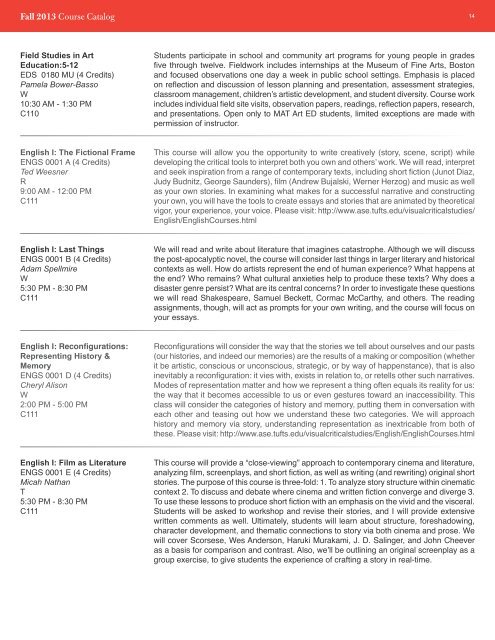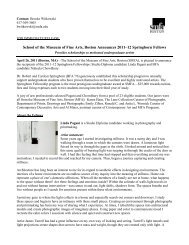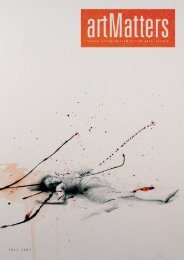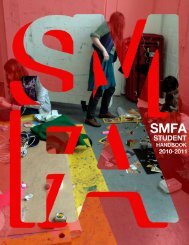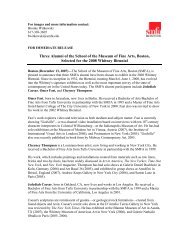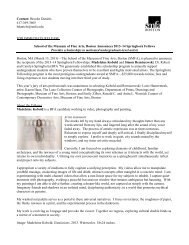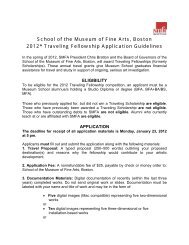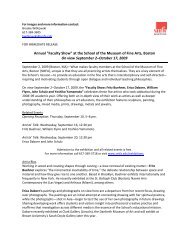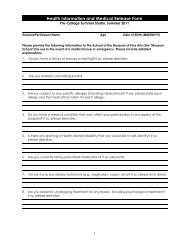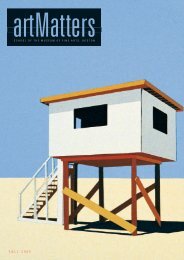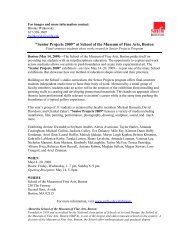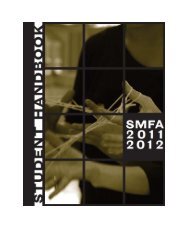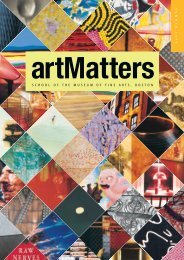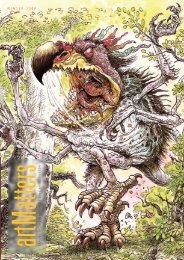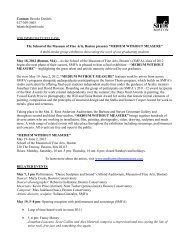Fall 2013 Course Catalog - School of the Museum of Fine Arts
Fall 2013 Course Catalog - School of the Museum of Fine Arts
Fall 2013 Course Catalog - School of the Museum of Fine Arts
You also want an ePaper? Increase the reach of your titles
YUMPU automatically turns print PDFs into web optimized ePapers that Google loves.
<strong>Fall</strong> <strong>2013</strong> <strong>Course</strong> <strong>Catalog</strong><br />
14<br />
Field Studies in Art<br />
Education:5-12<br />
EDS 0180 MU (4 Credits)<br />
Pamela Bower-Basso<br />
W<br />
10:30 AM - 1:30 PM<br />
C110<br />
Students participate in school and community art programs for young people in grades<br />
five through twelve. Fieldwork includes internships at <strong>the</strong> <strong>Museum</strong> <strong>of</strong> <strong>Fine</strong> <strong>Arts</strong>, Boston<br />
and focused observations one day a week in public school settings. Emphasis is placed<br />
on reflection and discussion <strong>of</strong> lesson planning and presentation, assessment strategies,<br />
classroom management, children’s artistic development, and student diversity. <strong>Course</strong> work<br />
includes individual field site visits, observation papers, readings, reflection papers, research,<br />
and presentations. Open only to MAT Art ED students, limited exceptions are made with<br />
permission <strong>of</strong> instructor.<br />
English I: The Fictional Frame<br />
ENGS 0001 A (4 Credits)<br />
Ted Weesner<br />
R<br />
9:00 AM - 12:00 PM<br />
C111<br />
This course will allow you <strong>the</strong> opportunity to write creatively (story, scene, script) while<br />
developing <strong>the</strong> critical tools to interpret both you own and o<strong>the</strong>rs’ work. We will read, interpret<br />
and seek inspiration from a range <strong>of</strong> contemporary texts, including short fiction (Junot Diaz,<br />
Judy Budnitz, George Saunders), film (Andrew Bujalski, Werner Herzog) and music as well<br />
as your own stories. In examining what makes for a successful narrative and constructing<br />
your own, you will have <strong>the</strong> tools to create essays and stories that are animated by <strong>the</strong>oretical<br />
vigor, your experience, your voice. Please visit: http://www.ase.tufts.edu/visualcriticalstudies/<br />
English/English<strong>Course</strong>s.html<br />
English I: Last Things<br />
ENGS 0001 B (4 Credits)<br />
Adam Spellmire<br />
W<br />
5:30 PM - 8:30 PM<br />
C111<br />
We will read and write about literature that imagines catastrophe. Although we will discuss<br />
<strong>the</strong> post-apocalyptic novel, <strong>the</strong> course will consider last things in larger literary and historical<br />
contexts as well. How do artists represent <strong>the</strong> end <strong>of</strong> human experience? What happens at<br />
<strong>the</strong> end? Who remains? What cultural anxieties help to produce <strong>the</strong>se texts? Why does a<br />
disaster genre persist? What are its central concerns? In order to investigate <strong>the</strong>se questions<br />
we will read Shakespeare, Samuel Beckett, Cormac McCarthy, and o<strong>the</strong>rs. The reading<br />
assignments, though, will act as prompts for your own writing, and <strong>the</strong> course will focus on<br />
your essays.<br />
English I: Reconfigurations:<br />
Representing History &<br />
Memory<br />
ENGS 0001 D (4 Credits)<br />
Cheryl Alison<br />
W<br />
2:00 PM - 5:00 PM<br />
C111<br />
Reconfigurations will consider <strong>the</strong> way that <strong>the</strong> stories we tell about ourselves and our pasts<br />
(our histories, and indeed our memories) are <strong>the</strong> results <strong>of</strong> a making or composition (whe<strong>the</strong>r<br />
it be artistic, conscious or unconscious, strategic, or by way <strong>of</strong> happenstance), that is also<br />
inevitably a reconfiguration: it vies with, exists in relation to, or retells o<strong>the</strong>r such narratives.<br />
Modes <strong>of</strong> representation matter and how we represent a thing <strong>of</strong>ten equals its reality for us:<br />
<strong>the</strong> way that it becomes accessible to us or even gestures toward an inaccessibility. This<br />
class will consider <strong>the</strong> categories <strong>of</strong> history and memory, putting <strong>the</strong>m in conversation with<br />
each o<strong>the</strong>r and teasing out how we understand <strong>the</strong>se two categories. We will approach<br />
history and memory via story, understanding representation as inextricable from both <strong>of</strong><br />
<strong>the</strong>se. Please visit: http://www.ase.tufts.edu/visualcriticalstudies/English/English<strong>Course</strong>s.html<br />
English I: Film as Literature<br />
ENGS 0001 E (4 Credits)<br />
Micah Nathan<br />
T<br />
5:30 PM - 8:30 PM<br />
C111<br />
This course will provide a “close-viewing” approach to contemporary cinema and literature,<br />
analyzing film, screenplays, and short fiction, as well as writing (and rewriting) original short<br />
stories. The purpose <strong>of</strong> this course is three-fold: 1. To analyze story structure within cinematic<br />
context 2. To discuss and debate where cinema and written fiction converge and diverge 3.<br />
To use <strong>the</strong>se lessons to produce short fiction with an emphasis on <strong>the</strong> vivid and <strong>the</strong> visceral.<br />
Students will be asked to workshop and revise <strong>the</strong>ir stories, and I will provide extensive<br />
written comments as well. Ultimately, students will learn about structure, foreshadowing,<br />
character development, and <strong>the</strong>matic connections to story via both cinema and prose. We<br />
will cover Scorsese, Wes Anderson, Haruki Murakami, J. D. Salinger, and John Cheever<br />
as a basis for comparison and contrast. Also, we’ll be outlining an original screenplay as a<br />
group exercise, to give students <strong>the</strong> experience <strong>of</strong> crafting a story in real-time.


